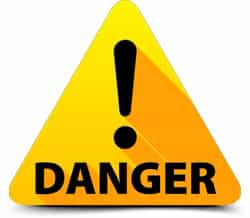Many pests challenge a pool or spa. At an aquatic facility pests can present themselves in the forms of algae, fungi, bacteria, or viruses. Different pesticides exist to address these pests. A pesticide is defined as a chemical used to prevent, destroy, or mitigate pests. Pesticides offer great benefits to an aquatic facility by removing pests. At the same time pesticides also present a potential hazard. Most pesticides contain chemicals that are harmful to people. As a result a person in charge of an aquatic facility must understand pesticide labels and recognize the certifications needed to apply pesticides.
The Environmental Protection Agency (EPA) oversees pesticide product registration and labeling. Labels employ signal words to convey the toxicity or the threat level a product. Most people are used to seeing Danger, Warning, and Caution on labels. People unfamiliar with the use of pesticides may mistakenly think these tree words are used interchangeably. In reality Danger, Warning, and Caution have specific meanings:
Danger: Danger is the strongest of the tree signal words. A user must work extremely carefully when handling this class of product. If mishandled, serious medical problems or death could result. In addition to relaying a high potential for serious injury or death, "Danger" is also used for products that could explode when heated.
Warning: Warning indicates a lesser signal than danger, but users can still become very ill or badly injured from the product. Waring is also used to identify flammable products.
Caution: Caution means that the product can be harmful, but is less harmful than products that contain the danger or warning signal. Typically caution is used for products that could cause skin irritation, illness if fumes are inhaled, or trauma if the product comes in contact with the eyes.
Due to the different meanings of the signal words, a proper understanding of labels aides a person managing an aquatic facility. Labels also provide information concerning proper chemical doses, storage, and disposal.
Reading and understanding pesticide labels is only the first part of properly using pesticides at an aquatic facility. A person also needs to know their local codes that apply to pesticides. For instance I provide Pittsburgh pool services, so I focus on the codes set by the PA Department of Agriculture. In the Sate of Pennsylvania, anyone who handles pool chemicals for a public facility is required to have a registered Category 24 Pesticide Applicator Licence issued by the Pennsylvania Department of Agriculture. Among other pool pesticides, this applies to chlorine and bromine. Remember a pesticide is defined as a chemical used to prevent, destroy, or mitigate pests.
Proper handling of any pool chemicals in a public setting requires a certified applicator and proper record keeping. More information can be found about this requirement at PA DEPT OF HEALTH and Chapter 128 Pesticides. Allegheny Pool Services Co. carries pesticide insurance, a registered pesticide business number, and registered category 24 pesticide applicator licence. If you need a qualified person to handle, apply, and store pool chemicals at your facility we would love to assist you. At Allegheny Pool Services Co. we understand that labels, certifications, and training will only be effective when properly followed. We are committed to providing the greater Pittsburgh area with safe, fun, and clean pools. Our dedication to safety causes us to provide the utmost care and professionalism handing pool chemicals. More information can be found at our homepage.
Thanks for reading,
Tim Johnson

